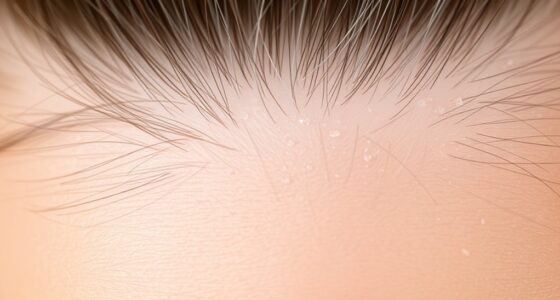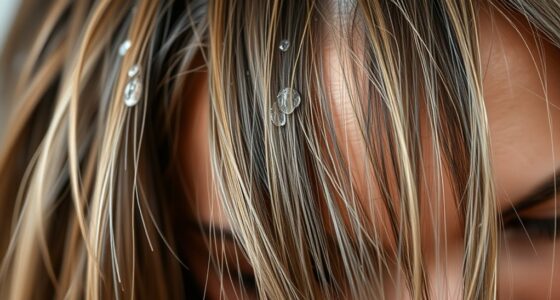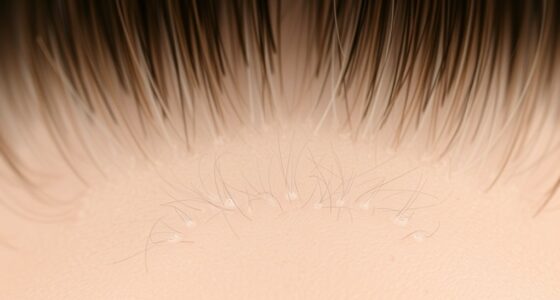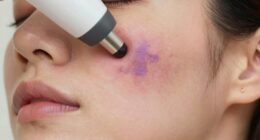Yes, your diet can greatly impact hair growth. When you eat protein-rich foods like lean meats, fish, and legumes, you support hair structure and strength. Key vitamins and minerals, such as Vitamin D and iron, promote healthy hair maintenance. Don’t forget omega-3s for scalp health and hydration to prevent dryness. Managing stress and staying active also contribute to lush locks. Discover more about the essential nutrients that can transform your hair health.
Key Takeaways
- A diet rich in protein from lean meats, fish, legumes, and dairy supports hair structure and growth.
- Essential vitamins like D, C, and minerals like iron are crucial for preventing hair loss and promoting strength.
- Omega-3 fatty acids found in fatty fish, walnuts, and flaxseeds enhance scalp health and stimulate growth.
- Staying hydrated is vital to keep hair follicles nourished and prevent dryness and breakage.
- Managing stress and ensuring quality sleep contribute significantly to overall hair health and vitality.
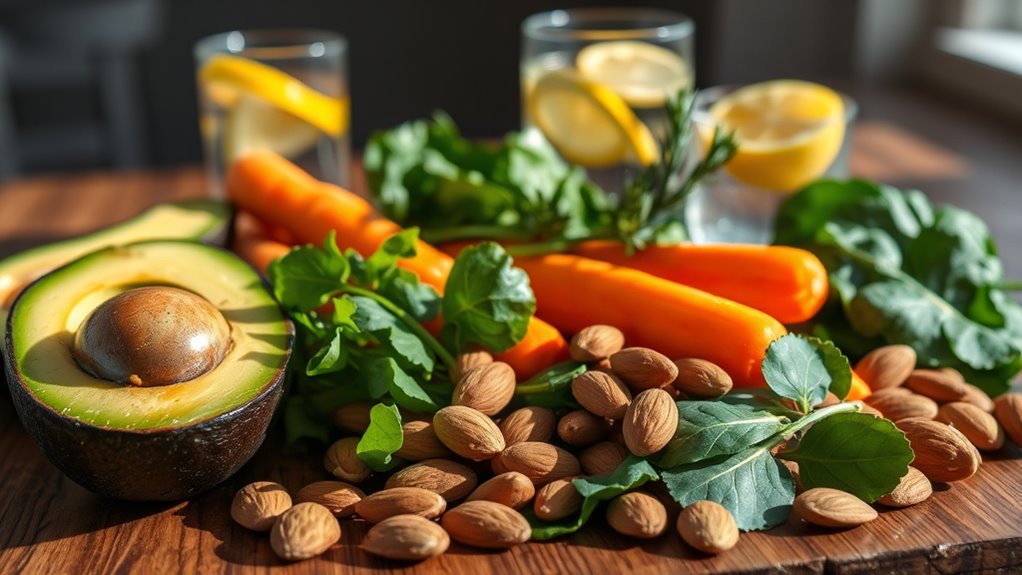
Can what you eat really influence your hair growth? Absolutely! Your diet plays a considerable role in determining the health and growth of your hair. The structure of your hair is primarily made of keratin, which is a type of protein. Thus, ensuring you consume enough protein-rich foods is essential. Lean meats, fish, legumes, and dairy products should be staples in your meals to support hair structure and prevent thinning. Engaging in activities that promote cognitive development can also help reduce stress, which is beneficial for hair health. Additionally, incorporating essential oils for hair growth can further enhance your hair’s vitality.
Your diet significantly influences hair growth; prioritize protein-rich foods for strong, healthy strands.
Don’t overlook vitamins and minerals either. Vitamin D, for example, has been linked to reduced hair loss. If you’re deficient, consider supplementation, as it can promote regrowth. Iron is another important nutrient; a deficiency often results in hair loss and brittle strands. Incorporating iron-rich foods like spinach, beans, and red meat can help maintain adequate levels for healthy hair. Moreover, a balanced diet that includes juice cleanses for detoxification can help ensure your body receives a variety of nutrients necessary for hair health.
Omega-3 fatty acids should also be on your radar. These healthy fats support scalp health, which is necessary for strong hair growth. You can find them in fatty fish, walnuts, and flaxseeds. Additionally, hydration is key. Drinking enough water not only benefits your overall health but also keeps your hair follicles hydrated, preventing dryness and breakage.
Balancing your diet is essential for ideal hair health. Aim to include a variety of foods—fruits, vegetables, whole grains, and lean proteins. Anti-inflammatory foods, particularly those rich in omega-3s, can greatly promote healthy growth. Don’t forget about vitamin C, found in berries; it aids collagen production, which supports hair health.
Beware of dietary deficiencies! Protein deficiency can lead to hair loss as your body struggles to produce enough keratin. Excessive vitamin A might also cause hair loss, despite its necessity for growth. Additionally, consuming too much sugar can lead to inflammation, negatively affecting your hair follicles.
Specific diets can have varying impacts on hair health. While the Mediterranean diet promotes overall well-being, a vegan diet may lack essential nutrients necessary for hair growth. Low-calorie diets can deprive your body of the energy it needs, leading to hair loss. On the flip side, a diet high in sugar can promote inflammation, which is detrimental to hair.
Lastly, consider how your lifestyle factors into hair health. Exercise improves blood circulation, helping nourish your hair follicles. Managing stress, getting quality sleep, and staying hydrated all contribute to maintaining lush locks. Furthermore, the importance of hydration cannot be overstated, as it is key to preventing dryness and breakage in hair strands.
Frequently Asked Questions
How Long Does It Take to See Hair Growth From Diet Changes?
When you make dietary changes to support hair growth, you mightn’t notice immediate results.
Typically, it takes several weeks to see initial improvements in hair health. After that, if you’ve stopped excessive shedding, significant regrowth could take two to three months.
Remember, consistency in your dietary adjustments is essential, as hair grows about half an inch per month.
Combining this with other lifestyle changes can further enhance your results.
Can Specific Foods Prevent Hair Loss?
Yes, specific foods can definitely prevent hair loss. You’ll want to include iron-rich foods like spinach and lean meats to boost blood flow to your scalp.
Incorporating omega-3 fatty acids from nuts and fatty fish will support your scalp health.
Don’t forget biotin-rich foods, such as eggs and almonds, which strengthen your hair.
Antioxidant-rich berries and vitamin C-rich strawberries can also protect your hair follicles and enhance overall hair strength.
Is Hair Growth Faster With Supplements?
Yes, hair growth can be faster with supplements.
When you take specific nutrients like biotin, vitamins, and minerals, they can enhance your hair’s growth cycle. Many studies show that these supplements not only support keratin production but also improve overall follicle health.
While a balanced diet is essential, combining it with supplements may yield even better results.
Just remember, individual responses can vary, so finding what works best for you is key.
Are There Any Foods to Avoid for Healthy Hair?
To maintain healthy hair, you should avoid certain foods.
Steer clear of dairy products, fried foods, and high-glycemic options like white bread, as they can lead to hair loss.
Processed and high-sugar foods, along with excessive alcohol and carbonated drinks, can dehydrate you and hinder hair health.
Also, limit fish high in mercury and artificial sweeteners, as they’re linked to thinning hair.
Focus on nutrient-rich alternatives instead!
Does Hydration Affect Hair Growth?
Think of your hair like a garden; without water, it wilts. Hydration directly affects hair growth by keeping your scalp healthy and preventing issues like dandruff and inflammation.
When you’re well-hydrated, your body absorbs essential nutrients better, supporting hair strength and growth. Aim for 8–10 glasses of water daily to maintain a vibrant scalp environment.
Conclusion
So, can diet really grow your hair? The answer lies in the nutrients you’re not getting enough of. Imagine revealing the secret to luscious locks just by adjusting your meals. What if the key to your hair goals has been sitting in your pantry all along? With the right vitamins and minerals, you could transform your hair from dull to dazzling. Are you ready to commence on this journey and discover the hidden potential of your diet?


